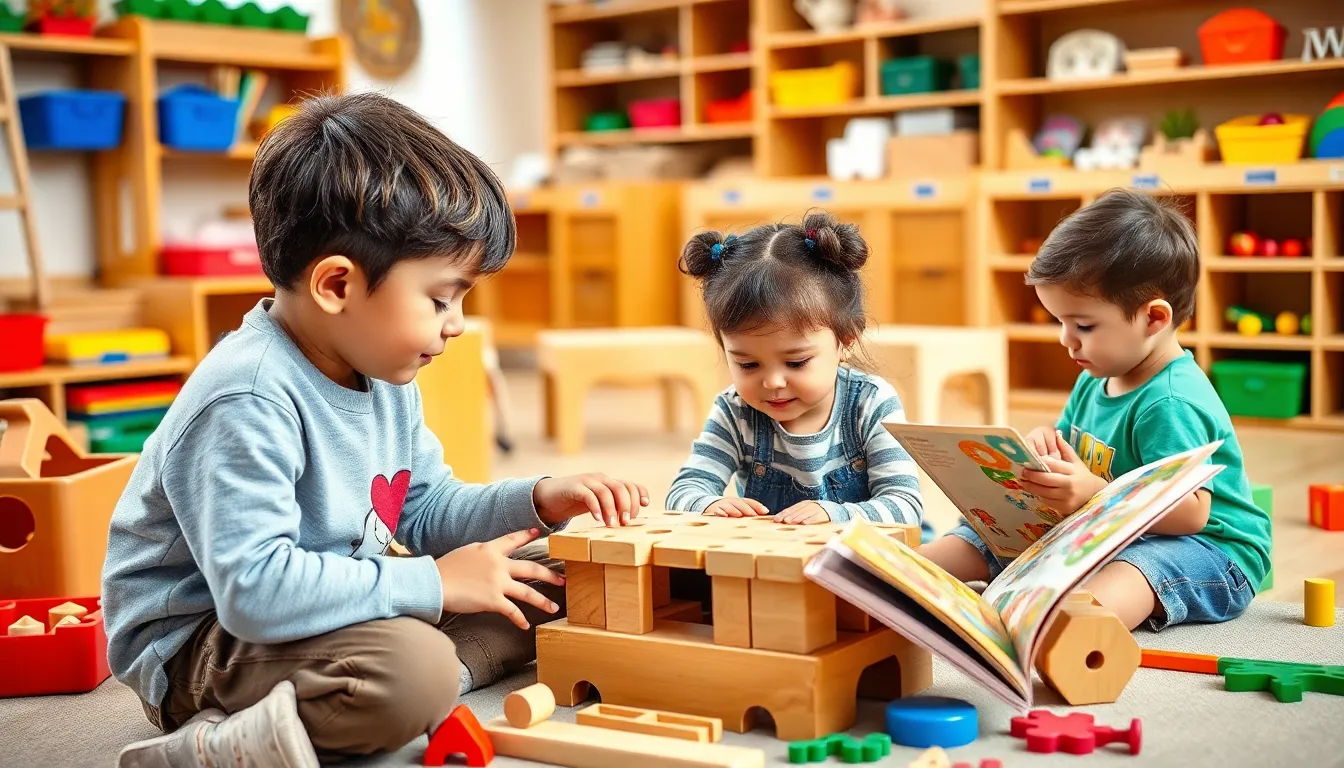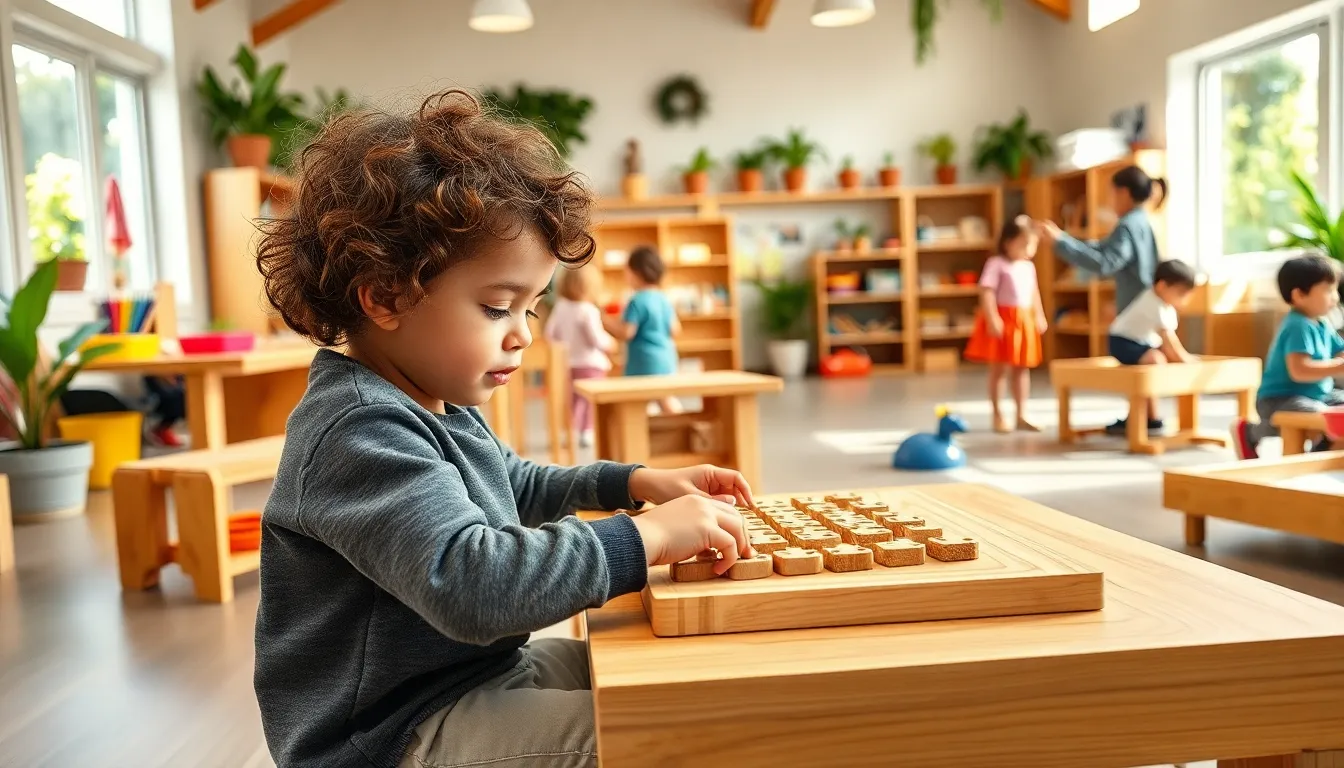Table of Contents
ToggleImagine a place where kids can explore, create, and learn all while having the time of their lives. Welcome to the Montessori activity center, where playtime meets purpose! This vibrant environment isn’t just a playground; it’s a carefully crafted space designed to ignite curiosity and foster independence in children.
In a world filled with screens and structured schedules, the Montessori approach stands out like a unicorn in a sea of horses. With hands-on activities that engage the senses and stimulate the mind, kids dive into learning without even realizing it. From building blocks to art stations, every corner invites exploration and discovery. So, if you’re ready to watch your little ones thrive in a setting that champions their natural instincts, buckle up! The Montessori activity center is about to become their new favorite destination.
Overview of Montessori Activity Centers
Montessori activity centers provide children with an environment fostering exploration and creativity. These centers emphasize independence, allowing kids to engage in self-directed learning. Play-based activities stimulate curiosity, helping children develop essential skills through hands-on experiences.
Natural materials often fill the centers, creating a sensory-rich atmosphere that enhances learning. Children interact with items like wooden puzzles, art supplies, and practical life tools. Each object serves a purpose, supporting cognitive development and fine motor skills.
Spaces within the center typically encourage collaboration and social interaction among peers. Group activities promote teamwork while individual tasks allow for personal reflection and growth. Many centers also incorporate nature, integrating outdoor play to enhance physical activity and connection to the environment.
Curriculum focuses on key developmental areas such as language, math, and sensory exploration. Learning activities include storytelling, counting games, and hands-on experiments. These experiences build a strong foundation, preparing children for future academic success.
Parents often notice positive changes in their children’s behavior and learning habits after attending these centers. Children demonstrate increased confidence, improved concentration, and enhanced problem-solving abilities. As a vibrant hub for family involvement, Montessori activity centers invite parents to engage actively in their child’s educational journey.
Overall, Montessori activity centers create dynamic environments that nurture curiosity, independence, and lifelong learning skills. They serve as vital support systems for both children and families, fostering a community committed to educational growth.
Benefits of Montessori Activity Centers

Montessori activity centers offer numerous advantages for children’s development. They create spaces that support learning through exploration and interaction.
Cognitive Development
Cognitive growth flourishes within Montessori activity centers. Engaging with hands-on materials stimulates curiosity and encourages problem-solving. Open-ended activities challenge children to think critically, fostering independence. Developmental experts note improvements in memory and focus linked to structured play experiences. Language skills expand as children explore new concepts through discussions and storytelling. Overall, these environments nurture creative thinking, laying a foundation for future academic success.
Social Skills Enhancement
Social skills gain significant strength in Montessori activity centers. Collaborative activities expose children to teamwork and sharing, essential interactions for developing friendships. Observing peers in cooperative play enhances empathy and communication skills. Educators encourage respectful dialogue, helping children learn to express their thoughts and feelings. Positive social interactions promote confidence in group settings. Parents often notice increased willingness in their children to engage socially, reflecting the supportive community these centers foster.
Designing a Montessori Activity Center
Designing a Montessori activity center involves creating a space that encourages exploration and independence. Thoughtful planning ensures children engage actively in their learning experiences.
Selecting the Right Materials
Selecting the right materials is crucial for a Montessori activity center. Natural items like wood, cloth, and metal encourage tactile exploration. For instance, wooden puzzles and stacking materials develop fine motor skills while promoting problem-solving. Sensory materials such as sand and water offer hands-on learning opportunities. Art supplies should include recyclable materials, allowing children to express creativity freely. Diverse items support various developmental areas, meeting individual learning needs.
Creating an Engaging Environment
Creating an engaging environment fosters curiosity and social interaction among children. Open spaces encourage movement and exploration. Colorful displays and inviting learning stations capture children’s attention and inspire creativity. Utilizing low shelves enables children to access materials independently, promoting autonomy. Designated areas for different activities, like reading corners and art stations, facilitate focused play. Incorporating plants can enhance the sensory experience, adding natural beauty. Overall, a well-designed center inspires enthusiastic participation from children while supporting their developmental needs.
Recommended Montessori Activity Centers
Choosing the right Montessori activity center can significantly impact a child’s development. Below are some highly recommended options tailored to various age groups and interests.
1. Montessori Materials and Toys
These materials foster hands-on learning and exploration. Look for items like wooden puzzles, stacking toys, and sensory bins that engage children’s senses. Brands such as Melissa & Doug and Montessori ‘n’ Such offer quality options that encourage active participation.
2. Child-Size Furniture
Creating an inviting environment includes incorporating child-size tables and chairs. These pieces promote independence and comfort during activities. Consider furniture from companies like Guidecraft or Habitat ‘n’ Home, which specialize in ergonomic, durable designs.
3. Art and Craft Stations
An art station stimulates creativity and self-expression. Include supplies such as non-toxic paint, paper, and recyclable materials for endless crafting possibilities. Art supplies from Crayola and Eco-Kids support eco-friendly practices while enhancing artistic exploration.
4. Sensory Play Areas
Sensory play enhances cognitive and motor skill development. Set up areas with sand, water, or sensory tables filled with various textures for children to explore. Companies like Lakeshore Learning provide diverse sensory play options perfect for an engaging experience.
5. Nature Exploration Zones
Integrating nature into the learning environment supports curiosity and ecological awareness. Create an outdoor space with plants, butterflies, and nature trails. Educational tools from Arbor Day Foundation and National Wildlife Federation offer resources for organizing outdoor activities.
6. Collaboration Spaces
Encouraging teamwork is vital for social development. Designate areas for group activities, like building blocks or collaborative art projects. Utilizing items from Imagination Station can facilitate cooperative play and boost social interactions among children.
These recommended options contribute to creating an enriching Montessori activity center. Prioritizing thoughtful selection ensures children thrive in a diverse, engaging learning environment.
Montessori activity centers offer a transformative space for children’s growth and development. By fostering independence and creativity through hands-on experiences, these centers create an enriching environment that encourages exploration. Parents can witness remarkable changes in their children’s confidence and social skills as they engage in collaborative play and self-directed learning.
The thoughtful design of these centers ensures that children have access to a variety of materials that stimulate their senses and promote cognitive development. With a focus on natural elements and open spaces, Montessori activity centers not only nurture curiosity but also lay the groundwork for lifelong learning. Investing in such an environment is a step toward supporting children’s holistic development.





